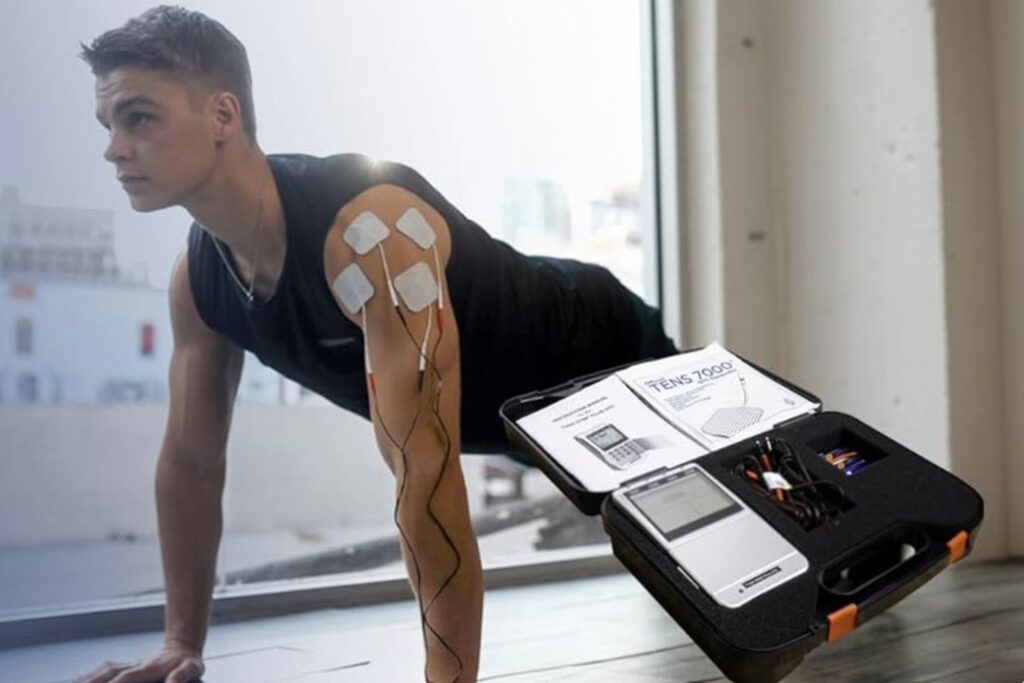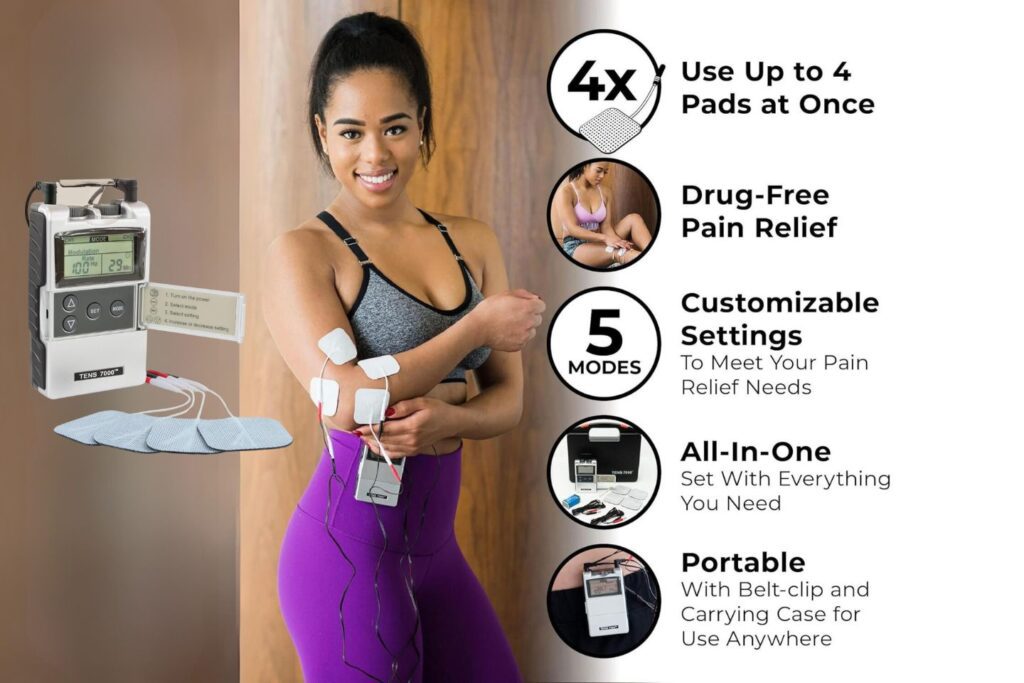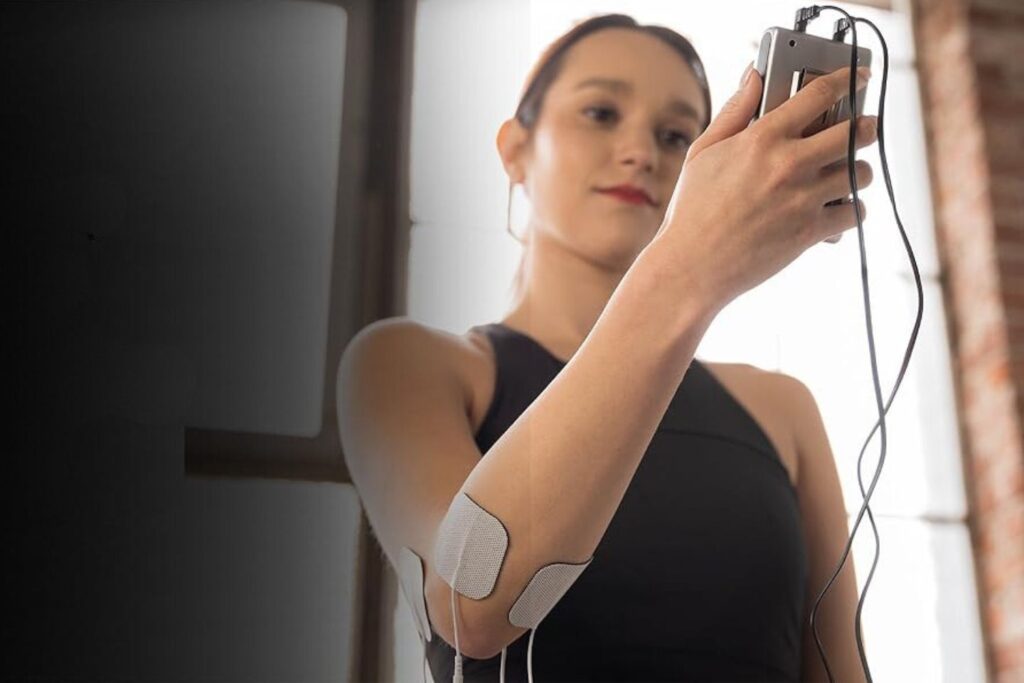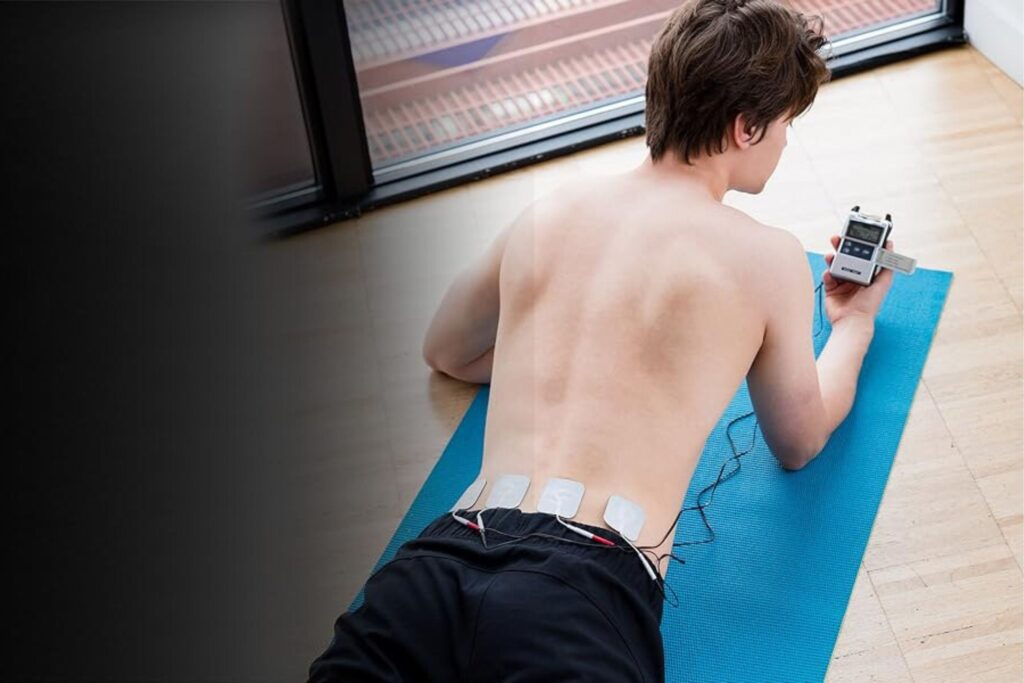A rotator cuff injury, yikes! This injury refers to damage or tears in the group of muscles and tendons surrounding the shoulder joint. This can occur when the shoulder experiences sudden force or impact, such as in a car accident, where the abrupt jolt or collision can strain or tear these structures. As a result, individuals may experience pain, weakness, and limited range of motion in the shoulder, impacting their daily activities and quality of life.
If you’re dealing with a torn rotator cuff, you might be seeking relief from the discomfort it causes. A Transcutaneous Electrical Nerve Stimulation (TENS) unit could be worth considering. This device aims to relieve pain by sending electrical impulses through the skin to interfere with the pain signals traveling to the brain. Despite not being a cure for a torn rotator cuff, a TENS unit may help manage the symptoms of this type of injury, allowing you to participate more comfortably in physical therapy and daily activities.
- Understanding Torn Rotator Cuff
- Principles of TENS Unit Therapy
- Benefits of TENS for Rotator Cuff Injury
- Recommended TENS Products for Rotator Cuff Injuries
- Application of TENS on Rotator Cuff
- Comparing TENS with Other Treatments
- Safety Precautions for Using TENS
- When to Consult a Professional
- Patient Testimonials and Case Studies
- Frequently Asked Questions
- Pursuing Compensation for Rotator Cuff Injuries: Your Next Steps
Understanding Torn Rotator Cuff
A torn rotator cuff refers to a tear in the group of muscles and tendons stabilizing your shoulder joint. These tissues allow you to lift and rotate your arms. Common causes for a tear might include repetitive motions, lifting heavy objects, or sustaining an injury, such as a fall.
Symptoms
- Pain, especially with arm movement
- Weakness when lifting or rotating your arm
- A crackling sensation when moving your shoulder in certain positions
Causes
- Degeneration: Tendons wearing down over time, often age-related
- Acute Tear: Resulting from an injury like a fall or lifting something too heavy
- Repetitive Stress: Repeating the same shoulder motions can weaken the tendons
- Lack of Blood Supply: As you age, blood flow to rotator cuff tendons decreases, impairing the body’s natural repair process
Diagnosis
To diagnose a torn rotator cuff, your healthcare provider may use imaging tests, such as MRI or ultrasound, which can reveal the extent of the tear. Sometimes, a simple physical exam would suffice to suggest a tear, but detailed imaging can help determine the best treatment.
Treatment
Treatment options vary from non-surgical methods, like physical therapy or using a TENS unit for pain management, to surgical approaches for more severe tears. Non-surgical treatments can sometimes offer sufficient relief and improved function in mild to moderate cases. If you have a torn rotator cuff, consider consulting with a physical therapist or a physician for a personalized treatment plan.
Principles of TENS Unit Therapy


When managing a torn rotator cuff, a TENS (Transcutaneous Electrical Nerve Stimulation) unit may be considered as part of your treatment strategy. This section will explain the basics of electrical stimulation and how TENS units work to alleviate pain.
Electrical Stimulation Basics
A TENS unit is a portable, battery-operated device that sends electrical impulses through the skin. These impulses are delivered via adhesive electrode pads placed on your skin near the area of pain. The fundamental principle of a TENS unit is to modulate pain signals before they reach the brain, potentially providing relief from discomfort associated with a torn rotator cuff.
- Frequency: This refers to the number of electrical impulses per second, measured in hertz (Hz). Commonly, settings range from low (<10Hz) to high (>50Hz).
- Intensity: This can be adjusted to a level that feels strong but not painful.
TENS Unit Mechanism of Action
The mechanism of action for a TENS unit involves two main theories:
- Gate Control Theory: It is hypothesized that stimulating non-painful nerves can interfere with the signals from pain fibers, thus ‘closing a gate’ to the pain signals in the spinal cord.
- Endorphin Release: At higher stimulation frequencies, a TENS unit may help to release endorphins, which are the body’s natural pain-relievers.
By strategically adjusting the electrodes around the shoulder joint, you can target the affected rotator cuff area. For instance, with specific TENS unit placement for rotator cuff pain, pads can be positioned above and below the shoulder joint, always maintaining about one inch of space between each pad for optimal results.
Benefits of TENS for Rotator Cuff Injury
Transcutaneous Electrical Nerve Stimulation, or TENS, offers therapeutic benefits for a torn rotator cuff by addressing pain and aiding in muscle recovery.
Pain Relief Potentials
TENS units are designed to provide pain relief by sending low-voltage electrical currents through the skin. This can effectively interrupt pain signals to the brain, which is particularly beneficial for your rotator cuff discomfort. Appropriate electrode placement is crucial; you should place them around the shoulder as guided by professionals for optimal results. Learn about proper TENS unit placement from a trusted health website.
Muscle Stimulation and Healing
Your muscle tissue can benefit from the stimulation provided by a TENS unit, which may increase blood circulation to the affected area. Enhanced circulation generally promotes healing and can contribute to the repair process of your rotator cuff injury. Experts explain that along with pain management, a TENS machine is used to help reduce inflammation and promote tissue regeneration. A detailed explanation of these benefits can be found on an authoritative health and fitness platform.
Recommended TENS Products for Rotator Cuff Injuries
Roscoe Medical TENS Unit and EMS Muscle Stimulator
- Includes EMS, Rehab Your Muscle Injury... Combo TENS EMS unit that will provide electric shock therapy for muscles and rehab for muscle injuries. TENS unit muscle stimulator and electric muscle stimulator machine(EMS), clinical strength stim machine
- Get Instant Pain Relief... TENS unit provides muscle pain relief for back pain, neck pain, shoulder pain, sciatica pain relief, and more. An electric muscle massager from the maker of the TENS 7000, a leader in back pain relief products and TENS machines
- An Industry Leader Since 2008... Roscoe Medical has over 10+ years providing back pain relief devices to consumers for drug-free pain relief. Trust our TENS units to get you back on the job or back on your feet, a leader in electro therapy for muscles
If you’re looking for a TENS unit and EMS machine that can provide both pain relief and muscle rehab for rotator cuff injuries, the Roscoe Medical Over-The-Counter 4-Channel Edition is a great choice.
| Pros: | Cons: |
Includes EMS for muscle rehab: With the combination of TENS and EMS, you can use this device to provide electric shock therapy for muscles and rehab for muscle injuries. Instant pain relief: The TENS unit can provide muscle pain relief for back pain, neck pain, shoulder pain, sciatica pain relief, and more. Trusted brand: Roscoe Medical has been providing back pain relief devices to consumers for over 10 years. | Faulty channels: Some users have reported that one of the channels may be faulty, causing a jarring sensation at higher levels. Not rechargeable: Although it comes in a nice case, it’s not as portable as a rechargeable device. Used units: Some users have received used units instead of brand-new ones. |
This TENS unit and EMS machine provide electro-stim using four independent channels that control up to eight TENS unit pads, just like the ones professionals use in their offices. The device features seven modes: a timer, a patient compliance meter, a new stronger 100 mA output, a safety amplitude cover, a sturdy metal belt clip, and rubber side railings for maximum handling.
TENS 7000 Digital TENS Unit
- Need Prescription Strength Pain Relief? A TENS unit muscle stimulator and TENS machine that provides pain relief, acts as a muscle massager or shoulder massager, provides carpal tunnel relief, and acts as a muscle relaxer(great for muscle recovery)
- Over 2M TENS 7000 Devices Sold... A consumer over the counter favorite back pain relief device and a leader in physical therapy equipment for providing immediate and lasting drug-free muscle pain relief from back pain, neck pain, tennis elbow, and bursitis
- A Leader Since 2008... A 15+ year favorite TENS device among medical professionals for delivering drug-free back pain relief as well as treating common ailments like neck pain, carpal tunnel relief, arthritis, shoulder, knee, elbow, leg and foot pain
If you’re looking for a powerful and professional TENS unit for your rotator cuff injury, the TENS 7000 is a great choice.
| Pros: | Cons: |
Need Prescription Strength Pain Relief? This TENS unit acts as a muscle massager, shoulder massager, and muscle relaxer, providing pain relief and carpal tunnel relief. Get Immediate Pain Relief with multiple TENS therapy modes that provide instant muscle pain relief. Professional Strength TENS Unit that is a muscle stimulator, nerve stimulator, and leader in sciatica pain relief devices. | The TENS 7000 comes with four electrodes, but you may need to purchase additional pads if you have a larger area to cover. The device is not rechargeable, requiring a single 9V battery to operate. The TENS 7000 is not waterproof, so you need to be careful when using it around water. |
The TENS 7000 is a leader in physical therapy equipment, providing immediate and lasting drug-free muscle pain relief from back pain, neck pain, tennis elbow, and bursitis. It is a 15+ year favorite TENS device among medical professionals for delivering drug-free back pain relief as well as treating common ailments like neck pain, carpal tunnel relief, arthritis, shoulder, knee, elbow, leg, and foot pain.
The device is easy to use, and the adhesive pads stick well, providing a lot of relief. It is quite powerful, so make sure you know what you’re doing. The TENS 7000 comes with high recommendations and is a great investment for those seeking professional-grade pain relief.
In conclusion, if you’re looking for a professional-grade TENS unit that provides immediate pain relief, acts as a muscle massager, and is a leader in sciatica pain relief devices, the TENS 7000 is a great choice.
Application of TENS on Rotator Cuff


Transcutaneous Electrical Nerve Stimulation (TENS) can be a valuable tool in managing pain for a torn rotator cuff. The right application of TENS therapy involves strategic electrode placement and adhering to recommended treatment duration and frequency.
Electrode Placement Strategies
When using a TENS unit for a rotator cuff injury, the placement of the electrodes is crucial for optimal pain relief. With units that have two channels (four pads), place two pads above your shoulder joint and two below. Ensure that you maintain a gap of about one inch between each pad for effective electrical stimulation. For a basic two-electrode system, one should be placed on the front of your shoulder and one behind it, targeting the painful areas directly. Additionally, if you have four electrodes at your disposal, complement the front and back placements with one on the side and one at the top of your shoulder blade to encompass the affected area more comprehensively.
Treatment Duration and Frequency
The frequency of your TENS sessions can vary depending on the severity and acuteness of your pain, with typical applications ranging from 15 to 30 minutes per session. It’s advised to start with shorter sessions to gauge your tolerance and response to the therapy. For chronic rotator cuff issues, you might find relief with multiple sessions per day, but give your skin time to rest between treatments to avoid irritation. Consistency is key; therefore, sticking to a daily schedule can be beneficial. Always consult with a healthcare professional to determine the best duration and frequency based on your specific condition.
Comparing TENS with Other Treatments
In managing a torn rotator cuff, your choice of treatment should consider effectiveness, side effects, and recovery times. Here’s how Transcutaneous Electrical Nerve Stimulation (TENS) measures up to common alternatives.
Physical Therapy
With physical therapy, you’re engaging in a structured program aimed at strengthening the shoulder muscles and improving flexibility. TENS, by comparison, is more passive and focuses on pain relief by delivering electrical impulses that may reduce pain signals and muscle spasms.
Medication and Injections
While medications, including pain relievers and anti-inflammatory drugs, offer quick relief, they can introduce side effects. A TENS unit offers pain relief without systemic side effects. Injections, like corticosteroids, offer targeted relief but may weaken tendons over time, unlike TENS, which is non-invasive.
Surgery Options
Surgery is generally reserved for severe cases and involves a longer recovery period. TENS therapy can be used post-operatively but also as a conservative approach to manage pain and facilitate rehabilitation before considering more invasive surgery options.
Safety Precautions for Using TENS


When using a Transcutaneous Electrical Nerve Stimulation (TENS) unit for a torn rotator cuff or any other ailment, following certain safety precautions is crucial to avoid complications or further injury.
Placement of Electrodes:
- Do not place electrodes on broken or irritated skin.
- Avoid placing electrodes directly over the heart, on the front of the neck, or on the temple area.
- Maintain at least a one-inch space between pads.
Device Settings:
- Start with the lowest intensity and gradually increase it to a comfortable level.
- Follow the manufacturer’s guidelines for usage duration and frequency.
Medical Conditions:
- If you have a pacemaker or any other type of electrical or metal implant, consult your physician before using a TENS unit.
- Pregnant women should avoid using a TENS unit unless it’s been cleared by their doctor.
General Use:
- Do not use TENS while driving or operating heavy machinery.
- If you experience pain or discomfort beyond mild muscle twitching, discontinue use and consult a healthcare professional.
After Use:
- After removing the electrodes, check your skin for any redness or irritation.
- Keep the device turned off when not in use.
When to Consult a Professional
Before considering using a TENS unit for a torn rotator cuff, it’s crucial to know when professional advice is warranted. This can ensure safe and effective use of the device.
Identifying Suitable Candidates
TENS therapy might be beneficial for a torn rotator cuff, but not all cases are suitable for self-management with TENS. You should consult a healthcare professional if your pain:
- Is severe or persistent
- Is accompanied by swelling or redness
- Affects your ability to carry out daily activities
Professional Guidance and Personalization
A professional can provide you with a personalized treatment plan that may include a TENS unit. They will consider:
- Your specific condition: Determining whether your rotator cuff tear is acute or chronic will influence the treatment approach.
- TENS unit settings: Professionals can offer guidance on the correct placement of electrodes and the appropriate intensity level for your pain relief.
Patient Testimonials and Case Studies


When considering the effectiveness of Transcutaneous Electrical Nerve Stimulation (TENS) for a torn rotator cuff, patient testimonials and specific case studies can offer valuable insights.
In one systematic review, TENS showed promise as a tool for managing rotator cuff tendinopathy, though this conclusion is drawn from a compilation of multiple patients’ experiences in clinical trials.
Moreover, individual case reports suggest that older patients can indeed find relief. For example, an extensive study reveals that exercise therapy could be beneficial even in cases of total tears of the rotator cuff, as reported by the patients.
Here is a brief overview of some patient feedback:
- Successful Rehabilitation: Patients often report significant improvements in shoulder function and pain management following a combination of TENS and physical therapy.
- Persistent Symptoms: Despite improvements, some patients do experience persistent symptoms years after the injury.
It’s worth noting your individual experience may vary, as each case of rotator cuff injury is unique. While many patients find value in using a TENS unit as part of their rehabilitation, effectiveness can depend on factors such as the severity of the injury and consistency in therapy application. Always consult with your healthcare provider for a treatment plan tailored to your specific condition.
Frequently Asked Questions
In this section, you’ll find targeted advice for using a TENS unit to aid recovery from various conditions related to the rotator cuff. Each subsection below addresses a specific concern with practical guidelines.
How should TENS pads be positioned to effectively alleviate rotator cuff injury discomfort?
To alleviate discomfort from a rotator cuff injury, place the TENS pads in such a manner that one pad is above the shoulder joint and another below it. When using a unit with four pads, the remaining two can be positioned on the front and back of the shoulder area. It is essential to maintain about an inch of space between each pad.
Can TENS therapy be beneficial for managing symptoms of shoulder impingement?
TENS therapy may help manage pain associated with shoulder impingement by reducing muscle tension and promoting circulation. Position the electrode pads around the affected area; one approach is placing a pad on the front of your shoulder and one on the back for a two-electrode setup.
What is the most effective method to utilize a TENS unit for frozen shoulder relief?
To use a TENS unit for frozen shoulder relief effectively, position the electrodes around the shoulder to cover different angles of the affected area. This multi-angle approach can help target the shoulder’s stiff and painful regions.
Is it safe to use a TENS unit following rotator cuff surgery, and what are the guidelines?
Post-surgery, a TENS unit can be used for pain relief, but following your surgeon’s guidelines is critical. Generally, electrodes should not be placed directly over the surgical site and should be used with a recovery plan.
What are the best practices for using a TENS unit to address shoulder blade pain?
For shoulder blade pain, place the TENS pads on the painful areas, ensuring even coverage. You can position a pad at the top of your shoulder blade and others around the painful zone to encompass the affected region comprehensively.
How frequently can a TENS unit be applied to manage shoulder pain without causing tissue damage?
You can safely use a TENS unit to manage shoulder pain several times a day as long as you follow the unit’s operational guidelines. Sessions typically last for about 15-20 minutes, but ensure you take breaks between uses to avoid overstimulation or tissue irritation.
Pursuing Compensation for Rotator Cuff Injuries: Your Next Steps
If you sustained a rotator cuff injury in a car accident due to another driver’s reckless behavior, you may be entitled to compensation for medical expenses, lost wages, and pain and suffering through a personal injury claim.
Similarly, if you were injured in a slip and fall accident on someone else’s property due to unsafe conditions, such as a wet floor without warning signs, and you suffered a rotator cuff injury, you could pursue a claim against the property owner or manager.
In any scenario where your rotator cuff injury resulted from another party’s negligence or wrongdoing, documenting the injury, seeking medical attention promptly, and consulting with a personal injury attorney can help you understand your legal options and pursue fair compensation for your damages. Good thing The Personal Injury Center can help you with it. Contact them today for more information.
Disclaimer: Last update on 2024-07-26 / Affiliate links / Images from Amazon Product Advertising API.
This content is provided solely for educational reasons and should not be seen as medical guidance. It’s important to consult with a healthcare expert prior to making any changes to your health regimen, including dietary adjustments or the use of supplements.
Pages on this website may contain affiliate links. As an Amazon Associate, we receive a commission from qualifying purchases. This commission is at no extra cost to you.



